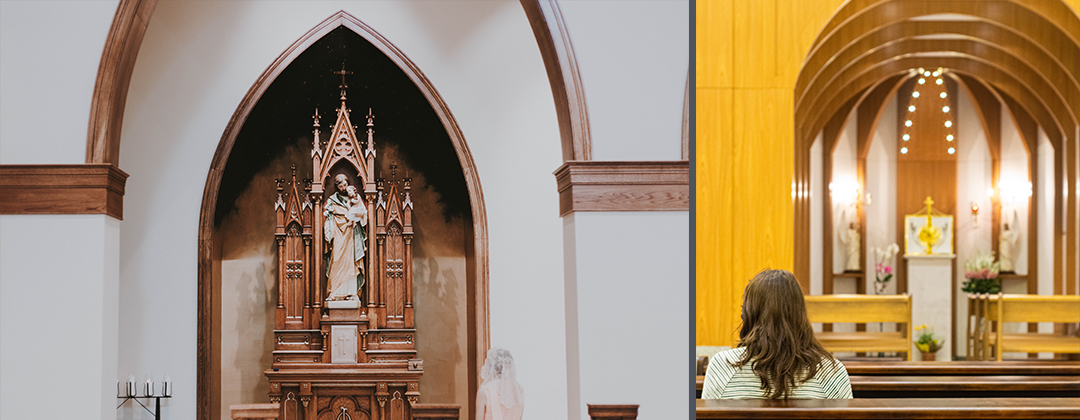What is a Parish Access Contact?
The Parish Access Contact is a parishioner, approved by the pastor who serves as a resource to support the inclusion and meaningful belonging of individuals with disabilities and their families in the life of the parish. This individual works in consultation with the pastor, staff, and parish volunteers. Parish Access Contacts should also connect with diocesan and national ministry leaders.
Top three responsibilities of a Parish Access Contact:
-
Be a Visible and Approachable Presence in the Parish
It is important to be as approachable as possible so that parishioners know that they can contact your parish for assistance regarding accessibility. In general, it is best to have persons with disabilities, or their family members or caregivers, contact you first. Many individuals with disabilities can advocate fully for themselves and may not need assistance. In order to ensure that parishioners do contact you if they need help, make sure there are various opportunities for members of the parish to reach out to you. Here are some ideas:
Weekly presence in parish bulletin and on website
- Example: Our parish desires the active participation of all members of our faith community. If you or your family member could benefit from an accommodation to facilitate your participation, please contact [Insert name of Parish Access Contact]. We are eager to assist you or your family member in any way that we can. [Email, Phone number]
Hold a Parish Access Forum
- A Parish Access Forum invites parishioners to request accommodations that could offer them or their loved ones the ability to fully participate in the life of the parish.
- Create an online and paper survey that people can fill out who may not be able to attend the forum.
Marketing for Events, Leadership Roles, Service Opportunities, etc.
- In your marketing materials include a statement such as:
- Please contact us if you could benefit from an accommodation such as screen reader access, wheelchair access, sign language interpretation, sensory adaptions, etc.
Catechetical Registration Forms
- Include a question such as:
- Could your child benefit from an accommodation during their catechetical formation? If so, please describe.
Creative Outreach
Plan events that accommodate persons with disabilities. Publicize these events at parish picnics, parish bazaars, as well as at local disability organizations and schools. Consider participation in ecumenical events.
- Offer a prayer service or faith formation opportunity at a local hospital.
- Offer a sensory-friendly Mass or prayer service.
- Offer a monthly movie night or community building event and include captions, a sign language interpreter, etc.
-
Be Aware of Best Practices and Resources
Learn about current resources which pertain to disability access and contact your fellow Parish Access Contacts and your diocesan director for support.
Catholic Organizations
- National Catholic Partnership on Disability (NCPD.org)
- National Catholic Office for the Deaf (NCOD.org)
- National Catholic Educational Association (NCEA.org)
- Xavier Society for the Blind (Xaviersocietyfortheblind.org)
- Catholic Celiac Society (www.Catholicceliacs.org)
Catholic Publishers (visit NCPD.org/publishers)
- Loyola Press
- Our Sunday Visitor
- Pflaum
- RCL Benziger
- Sadlier
- Twenty Third Publishers
- University of Dayton
Helpful Documents
- Pastoral Statement on U.S. Catholic Bishops on Persons with Disabilities(NCPD.org/Pastoralstatement)
- Welcome and Justice (Available on the USCCB website)
- Guidelines for the Celebration of the Sacraments with Persons with Disabilities, revised 2017. Available USCCB.org for purchase, in English, or pdf download in English or Spanish).
- Remarks of Pope Francis during a Papal audience with the participants of the October 2017 conference, “Catechesis and Persons with Disabilities” organized by the Pontifical Council for Promoting the New Evangelization (Available on Vatican website)
- Pastoral Response to Mental Illness (https://www.ncpd.org/resources_and_toolkits/pastoral-response-persons-me...)
-
Accompany
Remember to consult with and listen to the person who has reached out to you; there is no “one size fits all.” It is important to remember that every disability is different and every person with a disability is unique. For example, it is often said, if you have met one person with autism, you have met one person with autism. This is true for every disability. The best way one can effectively support a person with a disability is to get to know them individually. Pay attention to the specific requests, gifts, and needs of the person who has reached out to you.
Parish Access Contact To-do List
Arrange a Meeting with your Pastor.
- Keep in mind that you work directly for your pastor, assisting him in this ministry.
- Ask for guidance on his priorities and areas on which you could focus.
- Offer insights and suggestions for his approval.
- Create some shared objectives with timelines for completion.
- Set up periodic meetings to discuss updates on objectives and new information. Try to avoid a “once then done” mentality; maintain ongoing and friendly communication.
Explain Your Role and Offer Support to all Parish Staff and Councils (Youth Ministry, Faith Formation, Pastoral Council, Music Ministry, etc.)
-
Review the LAMB Inclusive Participation Assessment Tool created by NCPD’s Council on Intellectual and Developmental Disabilities.
Establish Communications with Fellow Parish Access Contacts
- Utilize the (arch)diocesan network of Parish Access Contacts to assist you in answering questions, learning best practices, and determining what is working and what is not working in neighboring parishes. Consider yourself not as an individual support person, but more as a member of an (arch)diocesan-wide network of peers doing similar work while sharing similar challenges and successes.
*Note: In some parishes, a team of Parish Access Contacts is identified and works together to accomplish the goals described in this resource.


